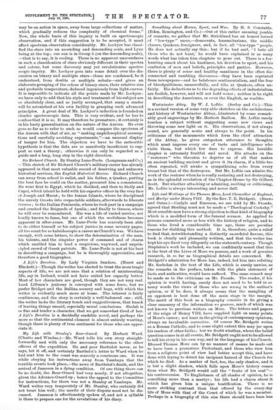Life and Writings of Sir Thomas More, Lord Chancellor of
England, and Martyr under Henry VIII. By the Rev. T. E. Bridgett. (Burns and Oates.)—Carlyle and Emerson, we are told by Mr. Fronde, agreed that Sterling must not be made a "Theological Cockshy." Most sensible men have a strong objection to that kind of biography which is a modified form of the funeral sermon. As applied to persons connected more or less with the history of religion, and to those who lived a considerable time ago, there are peculiar reasons for disliking this method. It is, therefore, quite a relief to find that, notwithstanding a distinctly sacerdotal flavour, this book is clearly and pleasantly written, and that the writer has kept his eye fixed very diligently on the sixteenth century. Though Stapleton's work be included, we can confidently assert that this is the best of the Lives of More we possess, and a work of genuine research, in so far as biographical details are concerned. Mr. Bridgett's admiration for More has, indeed, led him into refuting Mr. Seebohm in the text of the Life, which is surely unwise, as the remarks in the preface, taken with the plain statement of facts and authorities, would have sufficed. The same remark may be made as to the criticisms on Mr. Froude. The reader, if his opinion is worth having, surely does not need to be told in so many words the views of those who are wrong in the author's opinion, or if he does, it always seems that the mangling of an opponent is best done off the main stage in the margin. The merit of this book as a biography consists in its giving a clear summary of the information we possess, much of which was not known to previous writers on More. The letters and papers of the reign of Henry VIII. have supplied light on many points of More's career ; not least in the giving of contemporary opinions, always an invaluable corrective. Of course Mr. Bridgett writes as a Roman Catholic, and to some slight extent this may jar upon his readers of other faiths ; but we doubt whether, where the belief question comes in at all events, Mr. Bridgett ought not to be allowed to tell his story in his own way, and in the language of his Church. Blessed Thomas More can by no manner of means be made out to have been a premature Protestant, and those who view him from a religions point of view had better accept this, and have done with trying to detect his incipient hatred of the Church for which he died. As a matter of fact, too, the only shadow, and it is but a slight shadow, which falls upon More's history comes from what Mr. Bridgett would call the " fruits of his zeal"— his controversies. To Englishmen of all shades of opinion, he is something more than a martyr ; his life had a charm about it which has given him a unique beatification. There is no more striking contrast than that offered by the every-day life of More with that of the Court of which he was a member. Perhaps in a biography of this size there should have been less
of quotation, as the need for it in the want of a standard modern edition of More's works must shortly disappear. It seems, too, a suicidal piece of parsimony which sends an otherwise really useful little book into the world without a proper index.



















































 Previous page
Previous page